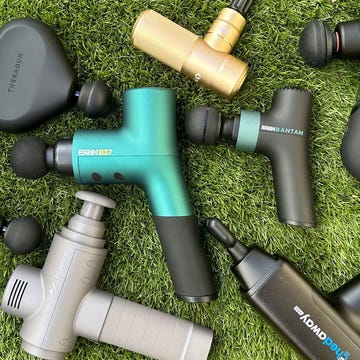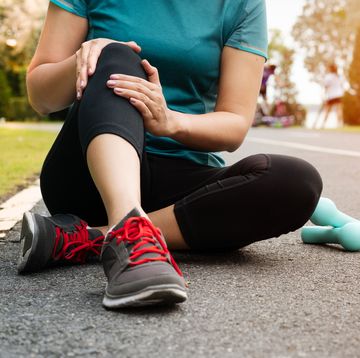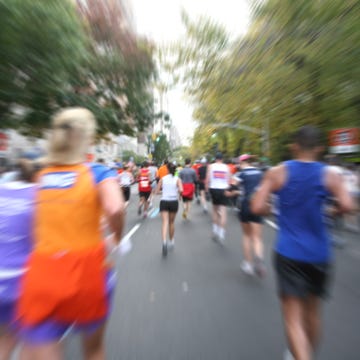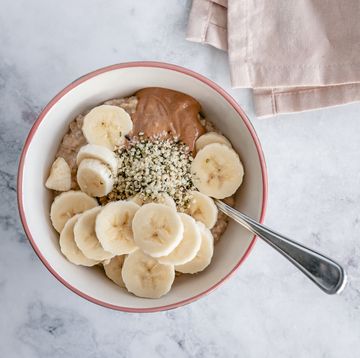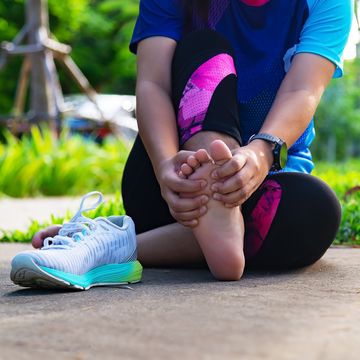According to Spotify Wrapped, I listened to a lot of music last year. As in, a lot – hundreds of hours’ worth. I’ve always been a music fan, but I couldn’t understand how I’d managed to intentionally absorb quite that much sound in 365 days.
I soon realised that a large proportion of this 'listening' took place at night – while I was mostly asleep. At the end of most days, I’d put on a 'rainfall' playlist to drown out noises that would otherwise keep me alert, as I’d heard that the sound of rain pitter-pattering can help you to drift off. And even now – because it genuinely helps me to sleep, or because it is a placebo that I believe helps me to sleep – I still sometimes put on this playlist before my head hits the pillow.
But why does this matter? Well, as it happens, these rain sounds are a form of pink noise – a random mix of audible frequencies that have been thought to improve your sleep, memory, cognitive ability and more. With this in mind, we asked experts to sound out whether pink noise could help runners to relax, recover and ultimately perform better.
What everyone's reading
What is pink noise?
In essence, pink noise contains all the sound frequencies that humans can hear. The focus is on the lower frequencies, which are generally considered to be gentler and more calming than shriller, higher-pitched frequencies. As such, pink noise is often used to block out annoying background sounds and create a more soothing sound environment.
What are examples of pink noise?
Pink noise is rooted in soft nature sounds, such as leaves rustling in trees, waves crashing against a shore, or (my favourite) rain falling against a canopy or window.
What’s the difference between pink noise and other colour noises?
Pink noise is just one of a spectrum of colour noises, which each have different frequency distributions. Brown noise focuses on lower, bass tones – like the rumbling sound of thunder – while blue noise is the opposite and amplifies the higher frequencies, making it harsher listening for most people.
Perhaps best known, though, is white noise. Like pink noise, white noise contains all the sound frequencies that a human can hear, only here the frequencies come through at the same intensity – imagine the monotonous drone of a vacuum cleaner or a whirring fan. It’s not uncommon for white noise to be used to drown out other sounds to improve concentration or sleep quality. In fact, a study published in Frontiers in Neurology found that hospital patients who were exposed to white noise fell asleep 38% faster than patients who were exposed to regular background noises.
Can pink noise benefit runners?
'While there is no conclusive evidence supporting pink noise for runners or athletes specifically, there could be some indirect advantages to using it,' says Dr Shelby Harris, director of sleep health at Sleepopolis.
'Pink noise's more balanced frequency distribution compared to other colour noises may help to improve sleep quality and memory, which are both important for physical performance and recovery,' Harris continues, suggesting that pink noise could be more effective than white noise in promoting better sleep. 'The soothing nature of pink noise could also help reduce stress and anxiety, which in turn could help athletes who are facing high pressure situations.'
So, while we are yet to see evidence of a direct link between pink noise and running performance, listening to these frequencies could help to improve aspects of your health that can influence your ability to run well. Adequate sleep, for instance, is an integral part of any runner’s training plan – no matter what your goal or experience level.
Banking at least seven hours of sleep a night can, among other benefits, enhance your mood, combat exhaustion, increase your reaction time and replenish your glycogen stores, giving you the energy you need to train and function well the next day. When we sleep, our pituitary glands also release a chemical into the bloodstream called human growth hormone (HGH), which essentially kickstarts our body’s daily restoration phase. HGH strengthens your bones, converts fat to fuel and, vitally, repairs the microscopic tears in your muscles that are generated when we do exercise like running.
When you skimp on sleep, however, you’ll have lower levels of HGH, negatively impacting the speed at which your body can recover from training – not to mention your state of mind, motivation and attention span. As a result, if you push on with running regardless, your body will be weaker and less prepared to handle your training load. This puts you in greater jeopardy of developing an unwelcome injury or illness, since inadequate sleep can also compromise the immune system. As per research published in the Journal of Pediatric Orthopaedics, student athletes who achieved less than eight hours of sleep a night were 1.7 times more likely to get injured than those who slept for eight hours or more.
Can pink noise be a problem for runners?
While the benefits of sleep for runners are well founded, listening to pink noise, according to some experts, might be counterintuitive when it comes to improving your sleep quality and general wellbeing.
'From an exercise physiology perspective, the research hasn’t been conducted yet to suggest there are any significant benefits to listening to pink noise,' says Anthony Fletcher, exercise physiologist, biomechanics coach and co-founder of Onetrack. 'In fact, a study has found negative impacts on sleep-dependent insight and pattern detection when listening to pink noise while sleeping. Being that sleep is a fundamental part of our brain's ability to process information, send and receive instructions, it would not be a good thing to reduce its effectiveness.'
Knowing the importance of sleep for runners (and, indeed, everyone), Fletcher suggests building other habits to help you drift off more quickly, especially if you find it difficult to relax or switch off before bedtime or are feeling anxious ahead of a race or big training session the next day.
'Based on the results that it may tamper with the natural rhythms of sleep, I’d say that pink noise would not be my go-to remedy. Things like getting off devices two hours before sleep, reading a book and making the room as dark as possible are much bigger hitters and have been shown to improve sleep quality and how quickly you fall asleep,' says Fletcher, pinpointing recent studies published in Nursing Forum and Sleep Medicine Reviews.
'If there are major issues around sleep, I’d always advise to speak to a professional who can give more detailed and bespoke information.'
The verdict on pink noise
Without solid science to prove the effectiveness of pink noise in improving sleep, reducing anxiety or catalysing other health benefits, its usefulness as a training tool for runners is difficult to establish. Instead, the benefits of pink noise are better judged on a case-by-case basis, as per an individual’s preferences and circumstances, and perhaps even their circadian rhythm.
'Night owls may find pink noise helpful in getting better sleep by masking other sounds in their sleeping environment that could disturb them, while early risers could enjoy how relaxing it is and its potential to improve sleep quality,' says Harris, pointing to pink noise as something that could affect you differently according to your sleep pattern. 'However, responses vary from person to person, and it’s a good idea to experiment with different sounds to see how effective pink noise is in their situation for sleep and overall wellbeing.'
Fletcher, meanwhile, suggests putting pink noise on mute, and making other changes to your routine to promote better holistic health and unlock more of your running potential.
Rachel is Runner's World UK's Senior Content Writer, covering all running-related topics from training advice and gear reviews to race reports and elite runner profiles. Formerly a Website Content Editor and Content Manager at London Marathon Events and The Running Channel respectively, Rachel is well-versed in the running scene and understands what it takes to put on some of the biggest running events in the world. A 2:50 marathoner, she would much rather run 26.2 miles than race a 5K and has currently completed 11 marathons, including five of the six Abbott World Marathon Majors in a sub-3 time. She now hopes to run the Tokyo Marathon to complete the set and become a Six Star Finisher.


